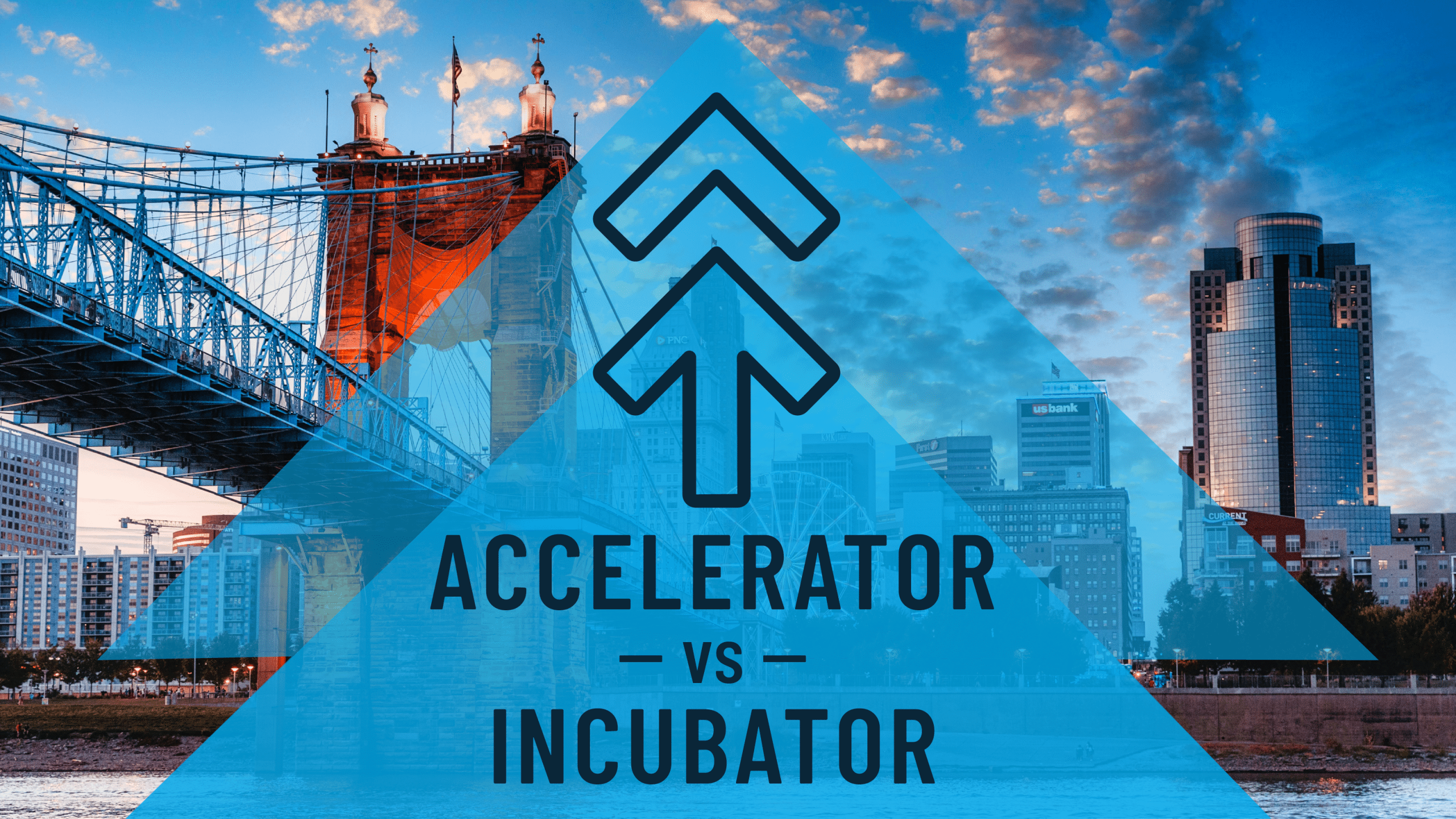Cincinnati has many different outlets for startup support, creating endless opportunities for businesses to bloom. In this article we will highlight some of the many opportunities available in our region and provide niched areas of expertise for startup resources.
If you are involved in a startup ecosystem, you are no stranger to the terms accelerator and incubator. Though they are often used interchangeably they have some key differences in their focus and structure. Accelerators tend to be more time-sensitive and intense—operating under a fixed duration to help bolster their growth. These programs have outlined modules and fixed program specifics. Incubators tend to offer more long term and startup specific support. The focus and implementation can fluctuate on a case-by-case basis.
This article will hone in on the key differences and functionality of an accelerator and an incubator as well as highlight some of the many exciting opportunities available in our region.
What is an accelerator?
Accelerators are designed to get the ball rolling for ventures. They come in during early formation of a startup with a knowledge bank of curated content and programming that is designed to provide high impact in a shortened time frame. Businesses participating in an accelerator program tend to be early stage and are looking for extra support on how to gain traction and funding.
Under the broad umbrella of startup accelerators there are a few defining factors that help to better understand its purpose and operation.
1.) Cohort Based
They operate under a cohort module bringing in multiple startups into their programming at one time. Accelerators tend to have some sort of commonality, such as background, stage, or industry, that makes the cohort process synonymous and applicable to each founder. Take Aviatra Accelerators for example, their 10 week Momentum Accelerator connects female entrepreneurs in the greater Cincinnati area prepping members for pitches and growth. Another example is Flywheel, specializing it social enterprises. More specifically, entrepreneurs who are addressing environmental sustainability or racial equity with their business model. In Flywheel programs, impact metrics receive special attention.
2.) Outlined/Predetermined Program Schedule
The specifics of the program in accelerator cohorts are typically fixed. Lightship’s accelerator educates minority & female tech founders through targeted coursework covered in 6 week increments. Throughout the program founders meet to discuss branding/marketing, product development, practical application of AI, legal considerations, fundraising, and how implementation of these techniques can help scale their business.
3.) Focus on Financial Funding
Accelerators work to help businesses gain traction and scale. Aiding in funding, either through direct investment or helping prepare a powerhouse of a pitch deck is a main focus for early stage companies entering these programs. Accelerators are strategic in doing just that; either through direct equity investments or ending with “demo days” to help entrepreneurs get in front of investors. Gener8tor Cincinnati is a direct investment accelerator that invests $100,000 in 5 selected ventures per cohort for a 7.5% equity stake. Over 12 weeks they give their high growth startups the ability to network with their expansive network and coordinate deals & perks with promising vendors. They then conclude with Premiere Night to further garner financial support and network building.
4.) Time Sensitive
Rapid acceleration of business concepts and scalability is the unique ability of accelerator programs. With innovation at the forefront of the mind keeping the process short and targeted in the goal of the teams of mentors, investors, and partners connecting with these early staged operations. Though the program length can vary, accelerator time frames usually fall between the 2 to 6 month mark. UC’s Venture Lab is one that has a unique approach to this structure within the Cincinnati area. It specifically targets novel business concepts, in what the term a pre-accelerator. Over their 8 week span they evaluate commercial potential and provide experienced mentors to prepare them for “graduation day”.
What is an incubator?
Incubators provide a different array of necessary support to startup founders, generally working with earlier ventures, while providing long term support across the startup growth spectrum. Though both programs are designed to trickle startup success incubators have less body to their coursework and lessons and more of a personalized mentorship experience. Entrepreneurs are thought to be more self-sufficient, providing additional guidance and opportunity to the in-between stages funneling additional growth through the incubator.
1.) Rally Community
Incubators offer a fairly dynamic strategy that requires cooperation and input from founders. Within this framework events and environments for growth are offered such as tangible spaces or external support. Northern Kentucky’s Incubator Kitchen Collective offers food founders 10,000 square feet of commercial kitchen space in addition to connections to outside collaborators.
2.) Individual Specific Support
Ocean’s Mastermind Program is a prime example of how incubators mold to accommodate the needs of different businesses. Mastermind provides biweekly meetings, one-on-ones, peer support and deep dives to drive further success and innovation for their community of entrepreneurs.
3.) Long Term Goals
Incubator programs operate differently than accelerator programs, as they are often more long term, with programing running around the 6+ month mark. Instead of rapid acceleration incubators work to foster sustainable growth, which may vary business to business. StartupUC Student Incubator has developed two separate paths to meet the founder at their level. Their Ideation Cohort helps to forge stable business modules from promising ideas through the “Learn Startup” methodology. Their secondary pathway is the Launch Cohort developing already established operations. Both programs run from the beginning of UC’s fall semester to the end of spring semester, allowing time for relationship building and ideas to foster.
How have accelerators and incubators been a catalyst for startups in our region?
Cincinnati startups have boundless opportunities to find enrichment and success through our region’s incubator and accelerator programs. These success stories speak to the quality of leadership, resources, and training our ecosystem is offering participating founders:

Missy De Groot, founder of an upscale fashion brand named in her likeness, found tremendous growth after participating in Aviatra’s Momentum Accelerator. During the program De Groot was able to connect with industry experts, improve her selling strategy, marketing, and gain clarity on her financial projections and business fundamentals. Being within the accelerator program opened her eyes to new avenues to explore within her servicing. In addition to creating upscale clutches, Missy saw an open opportunity to help designers like herself through consulting services. Her new organization Fashion All Aboard helps her clients navigate the tricky manufacturing process to bring their products to market.

Intersect Agriculture is a startup creating high protein animal feed with a sustainable spin. The company was already involved with the ecosystem, working to try to raise capital on their own, but received little traction. Deciding to look for new solutions Intersect Agriculture joined Flywheel’s SustainableCincy Accelerator, an 8 week program targeting startup success topics. During the program, staff worked with the Intersect Agriculture team to clarify their presentation and set reachable financial goals. As a result, the team has scaled back its expectations for a full scale facility and is focused on a starter operation and a multi step path to full scalability. Intersect Agriculture is now raising money to build their facility and signing MOUs for food waste supply and potential customers.
What's next?
When launching a startup from the ground up, having a community of support and expert knowledge can make or break the success of your venture. The momentum that has been building within the Cincinnati ecosystem has provided cutting edge support to hundreds of entrepreneurial ventures and serves as a commitment to innovation and ideation within our community. If you are looking to take new steps in your entrepreneurial journey through applications into an accelerator or incubator check out the StartupCincy Resource Compass. Within the resource compass you will find filters to help match your individual needs, filtering by name, expertise, industry, and stage to ensure alignment of your needs and to help champion your idea or business.

